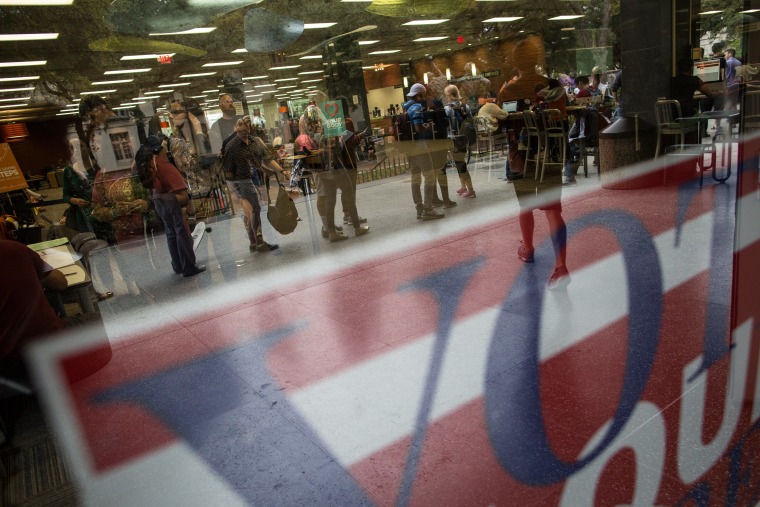Democrats have came out in support of a constitutional amendment guaranteeing the right to vote.
The proposed amendment has no realistic shot at passing for the foreseeable future. But the move points to an intensifying Democratic response to the wave of conservative efforts to restrict voting, and lays down a clear marker for the party's long-term goal.
“We have been having an expanding of the franchise in America. That’s the trajectory of history,” Rep. Keith Ellison (D-Minn.), who, with Rep. Mark Pocan (D-Wisc.) has introduced legislation in Congress for a right-vote amendment, told msnbc in an interview. “But in recent years, folks who don’t want everybody to vote have been very busy, and they’re trying to peel back the trajectory of opportunity to vote and participate in our society.”
RELATED: New voter restrictions, just in time for 2016
At its winter meeting Saturday in Florida, the Democratic National Committee unanimously passed a resolution that supports “amending the United States Constitution to explicitly guarantee an individual’s right to vote.” The DNC also said it would urge state parties to push for statewide referenda backing the idea, and pledged to create a “Right to Vote Task Force” to offer ideas on how to protect voting rights.
The resolution was submitted by Rep. Debbie Wasserman Schultz, the chair of the DNC, as well as Donna Brazile, a vice chair and prominent figure in the party.
The Constitution already prohibits stopping someone from voting on account of race (the 15th Amendment), sex (the 19th), and age, for those 18 and older (the 26th). It also bars the use of poll taxes or any other financial requirements (the 24th). But nowhere does it affirmatively guarantee the right to vote, and there are very few national standards for voting rules.
Since just after the disputed 2000 presidential election, a coalition of progressive academics, activists and others has been pushing for a right-to-vote amendment, and the first legislation was introduced in Congress in 2001. But in recent years, as a wave of Republican-backed voting restrictions has gone into effect, the campaign has gained momentum.
RELATED: Voter ID bill is dead in Nebraska
Supporters of an amendment say enshrining voting rights in the Constitution would raise the bar that voting restrictions have to meet if they’re to be upheld. Courts would likely apply a “strict scrutiny” standard, meaning backers of restrictive laws would have to show that there’s a pressing need for them, and that they’re narrowly tailored to address a legitimate purpose.
Currently, because voting rules are essentially controlled by the states, the burden is on voting rights advocates to show that new restrictions pose an unreasonable burden on would-be voters. That’s led to a mixed record for legal efforts to block voter ID laws and other high profile restrictions. Last fall, Texas’s voter ID law received a last-minute green light from the Supreme Court. An estimated 600,000 registered voters in the state didn’t have the ID required under the law.
“This would put the whole conversation around photo ID, and a lot of these restrictions on voting, in a whole new light,” said Ellison. “It would mean that the burden would be on the people who want to restrict the right to vote, not on the voter.”
Of course, amending the Constitution requires a two-thirds majority in both Houses, followed by ratification by 38 of 50 states. That makes the right-to-vote amendment a non-starter for the immediate future. Nonetheless, it comes as further evidence that Democrats are ramping up their response to the conservative assault on voting of recent years. That assault has included the 2013 Supreme Court ruling that weakened the Voting Rights Act—a decision that was highlighted at Sunday night’s Oscars ceremony.
Last year, President Obama, who had long taken a relatively understated tone on the issue for several years, forthrightly denounced Republican-backed voting restrictions. And the DNC itself launched a Voter Expansion Project, which aimed to raise awareness about these restrictions and increase turnout among marginalized groups. But the resolution passed Saturday suggests that after a midterm election in which strict voting laws were in force in several key states, the party sees the need to fight back more aggressively.
RELATED: GOP secretaries of state raise alarm about non-citizen voting
Democrats also want to draw a sharp contrast on the issue with the GOP, which has opposed legislation to strengthen the Voting Rights Act. A Republican National Committee spokesman did not respond to msnbc’s request for comment on whether the party would support a right-to-vote amendment.
Republicans aren't the only ones who aren't sold on the idea. In a new paper, Heather Gerken, an election law scholar at Yale University, and a prominent supporter of expanding access to voting, argues that any amendment that might pass would likely be so vaguely worded that it would do little to protect voting in practice.
